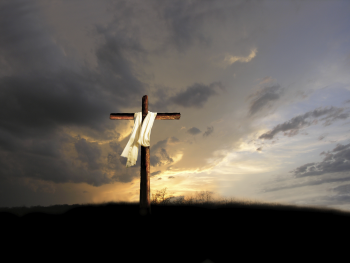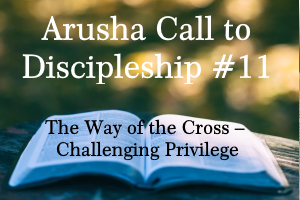The World Council of Churches’ Conference on World Mission and Evangelism met in Arusha, Tanzania, in March 2018. From this meeting, the more than 1,000 participants, who were all regularly engaged in mission and evangelism, issued the Arusha Call to Discipleship. At our own national church General Synod in 2019, resolution A-129 was passed that we affirm the Arusha Call; encourage bodies within the General Synod to integrate this call into the guiding principles of baptismal living for the shaping of national ministries; and commend the Arusha Call to dioceses for study and inclusion in their considerations of evangelism, witness and discipleship.
Spiritual Development Team members and others are offering reflections in the New Brunswick Anglican on the 12 points within this call. This is Call # 11, written by Cheryl Jacobs, chair of the Diocesan Spiritual Development Team. Cathedral Dean Geoffrey Hall previously wrote a reflection on Call #5, and Director of Christian Formation Kurt Schmidt wrote a reflection on Call #7.
We are called to follow the way of the cross, which challenges elitism, privilege, personal and structural power (Luke 9:23).
Then he said to them all: “Whoever wants to be my disciple must deny themselves and take up their cross daily and follow me.” Luke 9:23 NIV
Take up your cross, the Saviour said,
if you would my disciple be;
deny yourself, the world
forsake,
and humbly follow after me.
This familiar hymn, originally from a poem by Charles Everest, was sung at the worship service I was attending in Lent. I would say it was very familiar to me, but this time the third verse particularly struck me as if for the first time:

and let your foolish pride be still:
your Lord for you endured to die
upon a cross, on Calvary’s hill.
I, personally, am not a big fan of being shamed. Of course, as a person of European descent, privileged by good income and education, perhaps I am not often in a situation of being ashamed.
In fact, most of my feelings of shame are because I “have left undone those things which [I] ought to have done ... and have done those things which [I} ought not to have done.”
Part of the human condition, yes, and forgiven by the grace of our loving God, but a shame of my own making.
Many people, however, are made to feel shame, not for things of their own choosing, but rather because of their race, skin tone, language, biological sex, sexuality, or because they understand themselves as different from the general cultural norms.
Many of us have recently been enjoying listening to National Indigenous Archbishop Mark MacDonald. In April, while speaking to an Ottawa group on the reconciliation efforts by the Anglican Church of Canada, Archbishop Mark noted that most racism is inadvertent. These ways are encoded in us and “the ceiling” is invisible to those who impose it.
We Canadians typically identify with the descriptors “nice” and “fair,” and we find it hard to accept that systemic racism is a thing.
This, however, is certainly no excuse for us.
No! Elitism, privilege, personal and structural power are not the plan of God. In fact, as 1 Corinthians 1: 27-29 says: Isn’t it obvious that God deliberately chose men and women that the culture overlooks and exploits and abuses, chose these “nobodies” to expose the hollow pretensions of the “somebodies”?
That makes it quite clear that none of you can get by with blowing your own horn before God. (The Message)
Jesus goes on to say in Luke 9: “What good is it for someone to gain the whole world, and yet lose or forfeit their very self ?” (vs 25)
If we believe that Jesus is Lord of an eternal kingdom and that promise is for us, then really ‘what good is it’ to be one of the elite here and now? ‘What good is’ one’s privilege? ‘What good is’ power in this world, when it will always be nothing compared to God’s power?
So then, what does it mean to follow the way of the cross, to take it up daily?
At least in part, it means that we need to work harder to understand our own privilege, elitism, selfishness, and blindness — and we need to do this personally and as church communities.
Perhaps church communities can agree to hold each other accountable on privilege and racism. Let us talk together and ask BIPOC (Black, Indigenous, People of Colour), the LGBTQIA+ community, the homeless and other vulnerable persons to call us out when our attitudes are wrong.
As Archbishop of Canterbury Justin Welby says in his introduction to the Difference course: “When... we begin to handle diversity creatively and sincerely, honouring one another in our deep difference... we can begin to flourish together in previously unthinkable ways.” Perhaps, too, we should question why the Church is struggling so much to be back in the place of power it occupied for many of the last centuries and instead, seek to be the subversive agents for love in this world that God intended.
Take up your cross, let not its weight
fill your weak soul with vain alarm;
his strength shall bear your spirit up,
and brace your heart, and nerve your arm.
by Cheryl Jacobs
